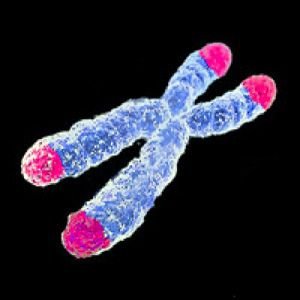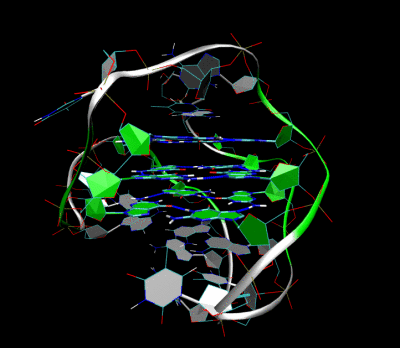New Research Suggests Infections During Infancy May Influence Your Ability To Fight Off Disease Later On In Life
This post is about work published today January 25, 2017 in the American Journal of Human Biology titled "Early life infection, but not breastfeeding, predicts adult blood telomere lengths in the Philippines." This piece of work is too interesting to pass up discussing briefly with you all!
I think my organizational style has been getting a bit stagnant as of late, so lets throw a wrench into the mix and start with the conclusions of the article!
Conclusions
The authors state:
These findings show that infancy diarrheal disease predicts a marker of cellular aging in adult immune cells. These findings suggest that early life infectious burden may influence late life health, or alternatively, that short telomeres in early life increases infectious disease susceptibility.
We can make this conclusion a bit more understandable and write it in non science article speak. The authors observed that sickness in infancy shortened the length of telomeric regions on the DNA of immune cells. Shortened telomeres increase the likelihood of cellular stress as the body ages, and since these shortened telomeric regions were found in immune cells, that cellular stress is predictive of increased difficulties fighting off diseases later on in life.

What Is A Telomere?
If you think back to an earlier post of mine about how DNA fits inside of the cell you will recall that it does so through compaction into a material called chromatin, that winds itself up into our chromosomes.
One aspect I did not discuss in that post was what the ends of the DNA on a chromosome look like! They are actually quite unique sequence wise, as they are long stretches of a specific repeating sequence. In higher eukaryotic organisms like you and I this repeating sequence is TTAGGG and it repeats around 1900 times (for a new born) at the ends of each of our 23 chromosomes.
The section of the chromosome where the TTAGGG repeating sequence is located is called a telomere (if you look back at the first/thumbnail image you can see this region colored in pink), the purpose of these repeating sequences is to protect the genes contained within the chromosomes, which is necessary due to the directional nature of how DNA is replicated on a linear template (like a chromosome, it's not a circle after all, on a circular template this would not be an issue). Each time a cell division occurs a bit of DNA from the ends of the chromosome is lost, the region it is lost from in this case is the telomeres, and it results in the removal of one or more of the repeat sequences. As a result of this over the course of a human life, we go from around 1900 repeating segments in our telomeres as a new born baby, to around 700 as an, elder human.
The telomeres also serve one additional function as linear DNA is a prime substrate for being chopped up by a variety of enzymes (they are called exonucleases and love to go nom nom nom starting at the end of a linear piece of DNA), the very final repeat in the telomeric region is not double stranded (like the rest of our DNA) but instead a single strand (again due to the directional nature of DNA replication, it runs out of space necessary to make the "lagging strand" leaving the other strand which does get extended all alone). This single stranded region which folds back onto itself forming a very interesting interwoven for layered structure called a G-quadruplex:

This G-quadruplex structure serves as a final sort of cap for the chromosome and stops those nucleases from chompin up our linear double stranded DNA by preventing them from binding (they don't like the 4 stranded structure of this G-quadruplex.)
Tangential Story, There is an Enzyme Which Can Elongate the Telomere Called Telomerase.
So if you read the news you may be familiar with telomerase, it's the enzyme people want to play around with to help us Live FOREVER!!!!

The desire to do this stems from 1. what I told you about above, telomere shortening is a function of aging , if the telomeres get too short cells die, and 2. the function of telomerase, it extends the telomeres. Longer telomeres, as some mad (lightning crashes, thunder rolls overhead) scientists would have us believe would mean longer human life.
However there are already some other human cells that have hyper active telomerase and ever rejuvenating telomeric regions. We know those cells by the term Cancer so maybe this idea isn't all it's cracked up to be. :)
So Tell Me About The Infant Diarrhea And How It Makes Me Die Younger
Okay, thats a weird way to put it... I think you want me to discuss the article. That I can do!
The Authors Hypothesis
Early life infections result in repeated generation of white blood cells, as a result of these repeated cell divisions should speed up the loss of telomeric repeats. Infection also increases oxidative stresses, which are a secondary cause for telomeric shortening. The authors note that infections also increase the production of cellular telomerase to deal with the shortening inevitably caused by the ramped up cell division needed to deal with the infections, however postulated that this was not sufficient to maintain the length of the telomeres. They also cited a few studies done in mice and birds where infections were induced in the animals and researchers observed shortened telomeres. (Source 1 and Source 2)
Thus the authors proposed two hypotheses, first that increased diarrhoeal infections (diarrhea is the second leading cause of death in young children (Source) and are very common) will result in shorter immune cell telomeres, and second a longer breast feeding period (known to strengthen the infant immune system) will keep telomeres longer.
What They Found
The results from their study (analysis was done on a sample size of 1759 individuals, so not a small sample) show that diarraheal infections during infancy correlated to shorter telomeric length in the blood cells of adults. They refined this down to stating that these infections at an age between 6 months and 1 year old, were what correlated the strongest to shorter adult telomere lengths.
The authors stated that an increase in one standard deviation relative to the average amount of diarrhea for an infant during the ages of 6 months to 1 year reduced adult telomere length by an amount equivalent to 3.3 years of aging. Quite a bit from just a bit more than average amount of illness.
What They Didn't Find
Any correlation between the duration of time a child was breast fed and telomeric length in adulthood. So despite breast feeding correlating to a stronger and more functional immune system in infants and young children, this increased immune function doesn't play any role in whether or not the telomeres get shorter.
Take Away
Shortened telomere's, are as we discussed above, symptomatic of older less functional cells. The authors found that young childhood infections lead to shorter telomeric regions in immune cells in adults, potentially implicating future immune system difficulties for those adults.
Other Comments
The authors only looked at this one disease subset, it would be interesting to know whether or not adult immune cell telomeric length is correlated to other childhood diseases. One would suspect yes, based on the cause being more cell growth needed to fight off the disease. Nevertheless, the studies would be interesting if performed, and this particular study indicates that it would be worth while to do so.
Sources
- http://onlinelibrary.wiley.com/doi/10.1002/ajhb.22962/full
- https://en.wikipedia.org/wiki/Telomere
- http://www.nature.com/articles/ncomms8643
- https://en.wikipedia.org/wiki/Exonuclease
- http://www.newsweek.com/2015/03/13/silicon-valley-trying-make-humans-immortal-and-finding-some-success-311402.html
- http://science.sciencemag.org/content/347/6220/436
- http://journals.plos.org/plosone/article?id=10.1371/journal.pone.0002143
All non Cited Images Are Available Under Creative Commons Licenses
Any Gifs Are From Giphy.com and Are Also Available for Use Under Creative Commons Licences
If you like my work, please consider giving me a follow: @justtryme90. I am a PhD holding biochemist with a love for science. My future science blog posts will cover a range of topics in the biology/chemistry fields.
Thank you for your continued support of my work! I appreciate all those who follow me (and those who don't too).
Fascinating!
Thanks for reading Eric!
This is great info! Thanks for sharing!
Thank you for reading, and your comment most of all!!
It was my absolute pleasure!
Great post. Love the idea of putting the conclusion at the top - like a mini abstract!
This makes sense and is consistent with what we have suspected for some time. Inflammation both increases oxidative stress and will likely shorten telomeres due to increased cell turnover.
Sadly we have a limited number of cell divisions for most cell lines and that upper limit is mainly governed by telomere length and telomorase activity.
My personal opinion is that this is the price you have to pay as a result of being a complex (large) multicellular organism in order to manage neoplastic (cancer) risk.
That is also why I think it is so potentially risky to modify telomere length using an enzyme like telomorase.
It adds the new wrinkle that increased cellular division rate due to infection further shortenes immune cell telomeres, however that this phenomenon is only correlated to a short period early in life. They didn't find as significant a correlation between infections occurring later in the child's life (which is interesting, because presumably the increased cellular division which they were attributing the phenomenon to should occur there as well.)
We are in full agreement.
Yes that is odd. Will be interesting to see more research on this. Perhaps this has some kind of effect on telomorase production?
That is what I would hypothesize, we will have to wait for follow up studies (hopefully) to learn more.
Cool.
This post has been ranked within the top 25 most undervalued posts in the first half of Jan 26. We estimate that this post is undervalued by $6.92 as compared to a scenario in which every voter had an equal say.
See the full rankings and details in The Daily Tribune: Jan 26 - Part I. You can also read about some of our methodology, data analysis and technical details in our initial post.
If you are the author and would prefer not to receive these comments, simply reply "Stop" to this comment.
I was wondering what could be the effect for an adult suffering from a lot of diarrhea? Says the guy who is traveling a lot (and whose stomach does not like it much :p )
That is a good question, one would suspect it would have a similar effect, however the author's did find this specific age range had the biggest correlation to shortened telomere length later in life. So perhaps telomerase is better controlled as we age? Dunno!
Would this impact be the same from induced immune responses in humans, say from vaccines given at a young age?
That's a good question. I don't have an answer for you, I can speculate but it's just my thoughts.
I can say that the immune response to a vaccination similar to but not the same that which occurs from actual infections IE infections cause prolonged responses while vaccinations result in a brief response (because there is no actual infection to fight off). Vaccines are administered multiple times so is the response from repeated brief immune stimulation during this age equivalent to the prolonged response of actual serious infection? I've no idea.
It is a reasonable hypothesis that there could be an impact, but I don't know of any study that has looked at that.
If there were a telomeric impact and the potential for weakened immune function later in life due to vaccination, would I still get vaccinated? Yeah. Still, would be interesting for someone to look into that.
As the reported effect from this study really only correlates to infections during this specific early life window (IIRC 6 months - 1 year), were there also a vaccination correlation then it could easily be remedied by beginning the vaccination schedule at a slightly later time in a childs development (IE at the 1 yr mark).
Cheers
Thank you for your response. I will look in to it more. If I find anything I will let you know. I am not against vaccines, but I feel we have gone too far with them. Spreading them out over a longer period of time and perhaps delaying the age are all good solutions.